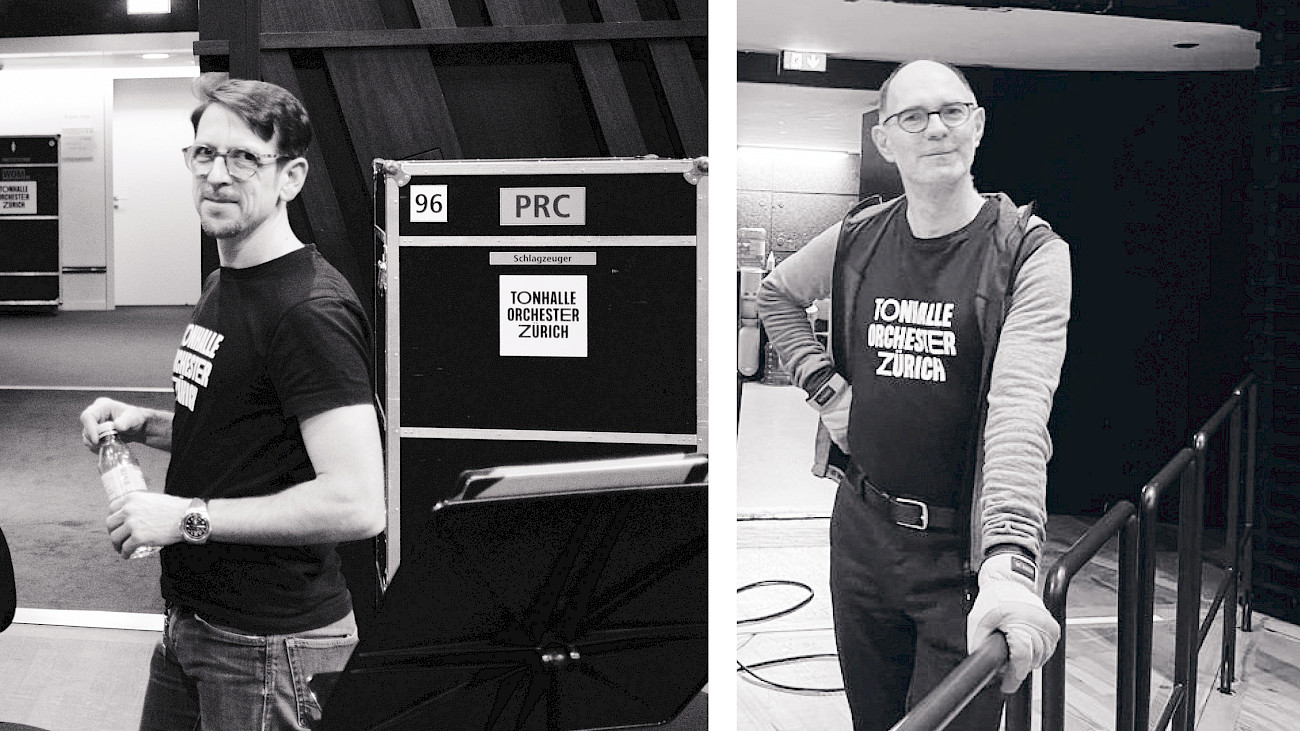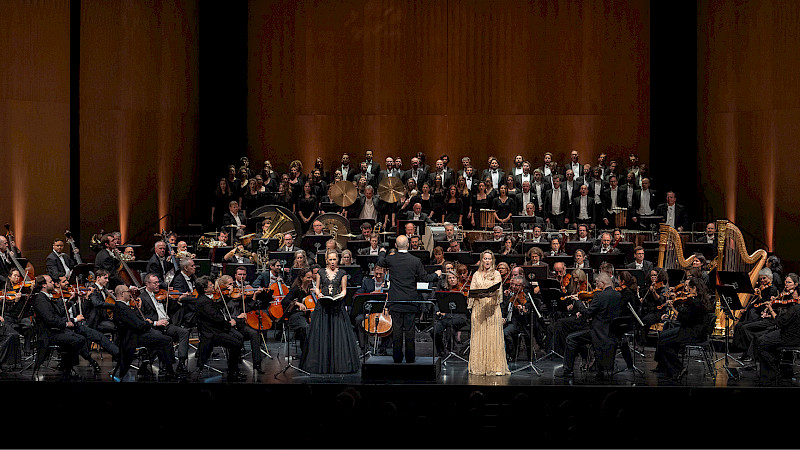
Never without Basler Läckerli
Friedemann Dürrschnabel and Matthias Lehmann are two of our orchestra technicians. Being on tour with the Tonhalle-Orchester Zürich is something special for them.
Friedemann and Matthias, what item do you take with you on every tour?
ML: A camera to document the concert halls and backstage areas. This is especially important when we play at a venue for the first time, in view of the re-invitation. I also just like to photograph orchestra life on the road.
FD: Basler Läckerli. Sometimes the day is so tightly scheduled that the meal is cancelled for us orchestra technicians.
What should Paavo never be without when travelling?
ML: Paavo actually always emphasises how happy he is about his personal fan. He comes from the north, after all. He likes it cold, he needs air movement, and not all dressing rooms have windows.
And for the orchestra?
FD: The seat cushions. UFO plates or plate mines, as we also call them. Every concert hall has different chairs on stage. With these seat cushions, our musicians can adjust the chairs individually. This is very specific to our orchestra, I don't know this from any guest ensemble. We also use these cushions in the Tonhalle Zürich. I'm sure the audience has already noticed them.
Three years ago, we carried out an instrument catalogue with the Swiss violin-making school in Brienz. In one week, all the instruments of the orchestra members were recorded. Why was that necessary?
ML: There are countries that require complete documentation of the materials used in an instrument. For example, if a violin bow has an ivory tip and tortoiseshell at the bottom of the frog, in some countries customs will confiscate it or even destroy it because the materials come from species-protected animals. Often the musicians don't even know whether they have an ivory or a mammoth tip on their violin bow - with which customs would have no problem. When we catalogue instruments, we have passports and can prove that the instruments do not contain any prohibited parts. Or we know that on a possible American tour we'd better take the bow made of carbon. We can now give our musicians the secure feeling that their own instrument will get into the country in one piece and come back in one piece. Or we can tell them that this specific instrument is better left at home.
So tours are very time-consuming in terms of preparation. Why are they so important nevertheless?
ML: From the audience's point of view, it is exciting to experience an ensemble with a different orchestral culture in «one's own» concert hall and then perhaps compare it with the orchestra at home. Despite globalisation, the Vienna Philharmonic and the Gewandhaus Orchestra, for example, have their very own sound. And so do we, of course.
FD: On tour, the collaboration of Paavo and the Tonhalle-Orchester Zürich so far appears as if under a burning glass. They have grown together sonically since their start, and they now have their hall, their sound space back after moving back to the Tonhalle Zürich. This shapes our sound quality. Different concert halls such as the Elbphilharmonie in Hamburg, the Musikverein in Vienna or the Philharmonie de Paris take us even further with their own very good acoustics, because the musicians adapt the individual sound quality to the respective ambience and make it shine. Through highly concentrated playing in foreign concert halls, we become even more aware of our own quality. And then travelling also simply welds us together. Or as we now call it: team building.
The job of an orchestra technician involves being the first and the last on stage: You prepare it, and you take it all down again. On tour, this rhythm of work is particularly challenging. What does that mean in concrete terms?
FD: Long days, short nights.
ML: European tours have turned out to be the most exhausting because of the distances, because you can travel and perform in the same day. We orchestra technicians dismantle the night before and are at the hotel after midnight. The next morning, it's an early start for us. We travel ahead of the orchestra to prepare the stage at the new concert venue. On European tours, this goes on for four or five days in a row until we have a first day off.
Good planning is essential for such a rhythm. How do you go about it?
ML: You know that puzzle-like computer game Tetris? We have a kit with all the cases, as we call the boxes for the instruments, in a ratio of one to ten. Each case exists as a small wooden model. A case for a double bass is about the size of an espresso cup. We also have the loading space of the truck as a model in the form of a plexiglas square. And so we concoct a loading order in advance – similar to Tetris: Which cases can be stacked, which can be placed far back in the hold?
What are the challenges for the musicians on tour?
ML: The atmosphere on tour is different than at home. Of course, a tour is a little adventure. You get around, travel to many cities. But you can't glorify it. A tour is often a borderline situation for musicians and the nervousness is palpable. It starts with the different food and the climate. Then they often can't practise as usual beforehand because the instrument is transported in a lorry or because it's difficult in the hotel room. The rhythm is completely disrupted, but everyone has to deliver a top performance in the evening.
How does that affect you?
ML: We are exposed to different temperatures when we travel, especially in Asian countries and South America. And making music is like a high-performance sport. There's an olfactory cloud when you open the dress cases at the end of a tour, especially from those with the tailcoats. The musicians are dressed thicker in their tailcoats compared to the female musicians. This has a corresponding effect.
FD: On tours with the Tonhalle-Orchester Zürich – and I know several orchestras – I experience a unique attitude in terms of modesty and professionalism. When travelling, our musicians focus everything on giving their best performance on stage in the evening. And that's why it's very pleasant to be on the road with this orchestra. Everyone is aware of what the other person contributes to the success. From my point of view, the respect in this orchestra is unique.
Translated with DeepL.com





